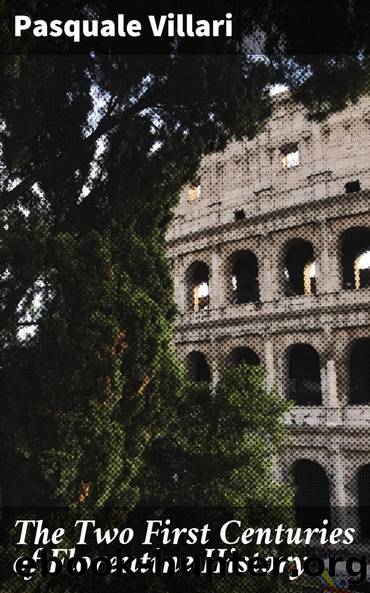The Two First Centuries of Florentine History by Pasquale Villari

Author:Pasquale Villari [Villari, Pasquale]
Language: eng
Format: epub
Tags: Nonfiction, History
ISBN: 4064066155230
Google: _VoGswEACAAJ
Publisher: Good Press
Published: 2019-12-18T05:00:00+00:00
V.
The seven guilds, already described by us, were styled the greater guilds, as being those of most importance and having the chief trade and wealth of the State in their hands. Several of these guilds consisted, as we have seen, rather of different crafts banded together, than of a single branch of industry; they gave employment to many workers, gathered and made use of enormous funds. But Florence also possessed the so-called lesser guilds numbering fourteen in all, namely: Linenmakers and Mercers, Shoemakers, Smiths, Salters, Butchers and Slaughterers, Wine-dealers, Innkeepers, Harnessmakers, Leatherdressers, Armourers, Ironmongers, Masons, Carpenters, Bakers.363
Certain smaller Florentine crafts had also obtained great repute in Italy: for instance, that of the wood and stone carvers, who were esteemed as some of the best in the world. In all work demanding any share of artistic ability the Tuscans stood unrivalled. Thus the Florentine moulders of waxen images were considered to have incomparable skill, and we even find this remarked by the chronicler Dei. But neither the carvers nor the wax moulders formed an association, and were artists rather than artizans. But, leaving this question aside, the lesser guilds, although numerous and energetic, failed to achieve any noteworthy influence. Their difference from the greater guilds mainly lay in the fact that, being solely concerned with the local trade of the Republic, they were confined to a very limited field of business and enterprise, while the others engaged in the trade with the East and the West, were enabled to attain a high position even in politics, and to finally become masters of the State.
Looking back on the period in which the greater guilds rose to power, we shall see that they simultaneously held in their grasp the commerce, wealth, and government of the Florentine Republic. We shall also readily understand the enormous energy they must have displayed in order to use politics as a means for increasing the opulence that, in the existing conditions of Italy, had become the chief strength of our communes. The Florentine merchants, having long divined that the future would belong to them, were always the firmest supporters of the Guelph party against the Imperial Ghibellinism of the nobles and had vowed eternal hatred to the latter. We may now imagine Florence as a huge house of business, situated in the centre of Tuscany, and surrounded by others all competing with it in the race for success. International law and equity were unknown to the Middle Ages: hence when any State felt envious of its neighbour, the obvious course to adopt was to prohibit that neighbour from traversing its territory, and exact unbearably heavy dues from the rival it feared. Accordingly, the Republic of Florence, being the object of still fiercer jealousy on account of the continual increase of its commerce, and lacking room to breathe, as it were, without access to the sea, would have been speedily reduced to impotence had it not resisted its neighbours by force of arms. Hence, the necessity of defending its
Download
This site does not store any files on its server. We only index and link to content provided by other sites. Please contact the content providers to delete copyright contents if any and email us, we'll remove relevant links or contents immediately.
Room 212 by Kate Stewart(5093)
The Crown by Robert Lacey(4793)
Endurance: Shackleton's Incredible Voyage by Alfred Lansing(4744)
The Iron Duke by The Iron Duke(4340)
The Rape of Nanking by Iris Chang(4191)
Joan of Arc by Mary Gordon(4082)
Killing England by Bill O'Reilly(3987)
Say Nothing by Patrick Radden Keefe(3966)
I'll Give You the Sun by Jandy Nelson(3421)
Shadow of Night by Deborah Harkness(3344)
Hitler's Monsters by Eric Kurlander(3321)
Mary, Queen of Scots, and the Murder of Lord Darnley by Alison Weir(3192)
Blood and Sand by Alex Von Tunzelmann(3181)
Eleanor & Park by Rainbow Rowell(3143)
Darkest Hour by Anthony McCarten(3113)
Margaret Thatcher: The Autobiography by Thatcher Margaret(3069)
Book of Life by Deborah Harkness(2914)
Red Famine: Stalin's War on Ukraine by Anne Applebaum(2912)
The One Memory of Flora Banks by Emily Barr(2850)
